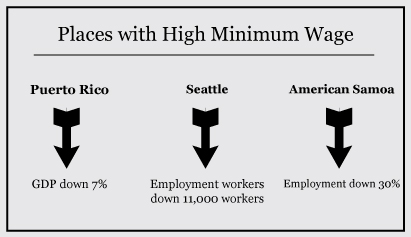Minimum wage hurts more than just economies
Seattle and Puerto Rico warn us to not follow in their footsteps of a $15 minimum wage.

Infographic by Tony Flores/THE CHIMES
April 26, 2016
On April 4, California governor Jerry Brown signed a bill that would make the minimum wage in California $15 an hour by 2022.
“This is about economic justice, it’s about people, it’s about creating a little, tiny balance in a system that every day becomes more unbalanced,” he said as “cheers and chants of ‘Sí, se pudo!’ — or “Yes, we could!” nearly drowned out the microphones,” reports the Los Angeles Times.
not necessarily about economics
To proponents of a higher minimum wage, the issue is not necessarily about economics, but about people. Governor Brown admits in his speech that economically it may not make sense, but “morally and socially and politically, [the minimum wages] make every sense because it binds the community together and makes sure that parents can take care of their kids in a much more satisfactory way.”
Unfortunately, we cannot so easily separate economic and moral sense. The economy affects the lives of people and when businesses do not do well financially, that means people, especially those working or who want to work minimum wage jobs, will soon be out of one.
We know when price increases, the quantity demanded decreases. The same applies to the labor market. The higher the price of labor, the fewer employees businesses will hire.
immodest increases will have immodest consequences
Ruben Gonzalez, senior advisor for strategic affairs at the Los Angeles Area Chamber of Commerce notes, “Everyone wants higher wages for folks, but if you can only raise prices so much…you’re going to be forced to cut hours, cut employees, change your business model and frankly, automate.”
But we do not have to take this theory as fact because California is not the first place to set a $15 wage. In April 2015, Seattle raised its minimum wage to $15 as well. Data from the Bureau of Labor Statistics suggests city employment has fallen by more than 11,000, the number of unemployed workers has risen by nearly 5,000, and the city’s jobless rate has increased by more than 1 percentage point, and all this within a year.
Some proponents of the raise argue that modest increases will have modest effects, but this means immodest increases will have immodest consequences.
Median wages — the wage where half the state workers earn more, and half earn less — act as good gauges of the modesty level of a minimum wage increase. According to the National Review, by 2022 a $15 minimum wage will correspond to 69 percent of the median-wage rate in California, up from 52 percent today.
mandatory increases
In Puerto Rico, where mandatory increases set the minimum wage at 75 percent of the median wage rate, GDP per capita declined by nearly 7 percent between the years 2007 and 2013. The law also caused the minimum wage in U.S. territories of American Samoa to raise by 50 cents per year until it reached the federal minimum wage. In American Samoa, by 2009, after only three of the increases, overall employment dropped 30 percent.
The California increase may not be so devastating, but fewer people who want to work will be working and the essence of the problem is that it will hurt those it meant to help.
If we want to help the common man, the unemployment caused by the increase in the price of labor will stunt their American Dream. It will not help them provide for their families — it will not give them a chance to.






